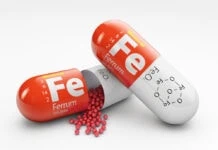 Vitamin B is a group of essential water-soluble vitamins that play important roles in maintaining overall health and wellbeing. The Vitamin B group includes B1 (thiamine), B2 (riboflavin), B3 (niacin), B5 (pantothenic acid), B6 (pyridoxine), B7 (biotin), B9 (folate or folic acid) and B12 (cobalamin). Each of these vitamins has specific functions, but collectively they help to support metabolism, energy production, and the health of the nervous system, skin, hair, and eyes.
Vitamin B is a group of essential water-soluble vitamins that play important roles in maintaining overall health and wellbeing. The Vitamin B group includes B1 (thiamine), B2 (riboflavin), B3 (niacin), B5 (pantothenic acid), B6 (pyridoxine), B7 (biotin), B9 (folate or folic acid) and B12 (cobalamin). Each of these vitamins has specific functions, but collectively they help to support metabolism, energy production, and the health of the nervous system, skin, hair, and eyes.
- Vitamin B1 (thiamine) helps convert food into energy and is essential for the health of the nervous system.
- Vitamin B2 (riboflavin) helps in the production of red blood cells and the maintenance of healthy skin, eyes, and hair.
- Vitamin B3 (niacin) helps in the production of energy and the maintenance of healthy skin and nerves.
- Vitamin B5 (pantothenic acid) helps in the production of hormones and is essential for the metabolism of carbohydrates, proteins and fats.
- Vitamin B6 (pyridoxine) helps in the production of red blood cells, the metabolism of proteins, and the maintenance of a healthy nervous system.
- Vitamin B7 (biotin) helps in the metabolism of carbohydrates, proteins and fats, and is essential for the health of skin, hair and nails.
- Vitamin B9 (folate or folic acid) helps in the production of red blood cells and the development of the nervous system.
- Vitamin B12 (cobalamin) helps in the production of red blood cells and the maintenance of a healthy nervous system.
It’s important to note that a deficiency in one or more of the B vitamins can lead to various health problems, such as anemia, fatigue, and neurological issues. A diet rich in fruits, vegetables, whole grains, and lean proteins can help ensure an adequate intake of B vitamins. However, for those who are at risk of deficiency, such as vegetarians, elderly individuals, or people with certain medical conditions, supplements may be necessary. It’s always best to consult with a doctor or dietitian to determine the right amount for you.
Source of Vitamin B
There are many natural food sources that provide the different B vitamins. Here are some examples of good dietary sources for each of the B vitamins:
- Vitamin B1 (thiamine): Whole grains, nuts, seeds, and legumes are good sources of thiamine.
- Vitamin B2 (riboflavin): Dairy products, eggs, leafy greens, and fortified cereals are good sources of riboflavin.
- Vitamin B3 (niacin): Meat, fish, poultry, and fortified cereals are good sources of niacin.
- Vitamin B5 (pantothenic acid): Meat, fish, poultry, whole grains, and legumes are good sources of pantothenic acid.
- Vitamin B6 (pyridoxine): Meat, fish, poultry, whole grains, and legumes are good sources of pyridoxine.
- Vitamin B7 (biotin): Eggs, nuts, seeds, and legumes are good sources of biotin.
- Vitamin B9 (folate or folic acid): Leafy greens, citrus fruits, and fortified cereals are good sources of folate.
- Vitamin B12 (cobalamin): Meat, fish, poultry, eggs, and dairy products are the best dietary sources of Vitamin B12, and it’s the only B vitamin that is not found in plant-based foods.
It’s worth noting that some food products may be fortified with B vitamins, such as cereals, bread, pasta, and plant-based milk alternatives. However, it’s always best to consult with a doctor or dietitian to determine the right amount for you, and to have a well-balanced diet to ensure you’re getting the right amount of B vitamins.
Benefit of vitamin B
The B vitamins have many benefits for overall health and wellbeing. Here are some examples of the benefits of the B vitamins:
- Vitamin B1 (thiamine) helps in converting food into energy and is essential for the health of the nervous system.
- Vitamin B2 (riboflavin) helps in the production of red blood cells and the maintenance of healthy skin, eyes, and hair.
- Vitamin B3 (niacin) helps in the production of energy and the maintenance of healthy skin and nerves.
- Vitamin B5 (pantothenic acid) helps in the production of hormones and is essential for the metabolism of carbohydrates, proteins and fats.
- Vitamin B6 (pyridoxine) helps in the production of red blood cells, the metabolism of proteins, and the maintenance of a healthy nervous system.
- Vitamin B7 (biotin) helps in the metabolism of carbohydrates, proteins and fats, and is essential for the health of skin, hair, and nails.
- Vitamin B9 (folate or folic acid) helps in the production of red blood cells and the development of the nervous system. It’s particularly important for pregnant women as it can help prevent birth defects.
- Vitamin B12 (cobalamin) helps in the production of red blood cells and the maintenance of a healthy nervous system. It’s particularly important for vegetarians and vegans as it’s mostly found in animal-based products.
It’s important to note that a deficiency in one or more of the B vitamins can lead to various health problems, such as anemia, fatigue, and neurological issues. A diet rich in fruits, vegetables, whole grains, and lean proteins can help ensure an adequate intake of B vitamins. However, for those who are at risk of deficiency, such as vegetarians, elderly individuals, or people with certain medical conditions, supplements may be necessary. It’s always best to consult with a doctor or dietitian to determine the right amount for you.
Recommended Vitamin B intake daily
The recommended daily intake (RDI) of the B vitamins varies depending on age, sex, and other factors. Here are the general recommended daily intake of each B vitamin:
- Vitamin B1 (thiamine): Men: 1.2 mg/day, Women: 1.1 mg/day
- Vitamin B2 (riboflavin): Men: 1.3 mg/day, Women: 1.1 mg/day
- Vitamin B3 (niacin): Men: 16 mg/day, Women: 14 mg/day
- Vitamin B5 (pantothenic acid): 5 mg/day for all adults
- Vitamin B6 (pyridoxine): Men: 1.3 mg/day, Women: 1.3 mg/day
- Vitamin B7 (biotin): 30 mcg/day for all adults
- Vitamin B9 (folate or folic acid): Men: 400 mcg/day, Women: 400 mcg/day, Pregnant women: 600-800 mcg/day
- Vitamin B12 (cobalamin): 2.4 mcg/day for all adults
It’s important to note that these are general guidelines and it’s best to consult with a healthcare professional to determine the right amount of B vitamins for you. Some people may require more or less B vitamins depending on their individual needs and health conditions.
Also, it’s worth noting that, the recommended intake for B vitamins are given in micrograms (mcg) and milligrams (mg) which are the standard measurements used in most countries, however, some countries may use different measurements.
It’s always best to consult with a doctor or dietitian to determine the right amount for you, and to have a well-balanced diet to ensure you’re getting the right amount of B vitamins.
Vitamin B Injection
Vitamin B injections are a way to increase the body’s Vitamin B levels when oral supplements or a balanced diet is not sufficient. These injections are typically administered by a healthcare professional, such as a doctor or nurse, and are given intramuscularly (into the muscle) or subcutaneously (under the skin).
Vitamin B injections are typically prescribed for individuals who are unable to absorb enough Vitamin B from oral supplements or a balanced diet due to certain medical conditions, such as Crohn’s disease, celiac disease, or pernicious anemia. They may also be prescribed for people who are at risk of Vitamin B deficiency due to certain lifestyle factors, such as a strict vegan diet, heavy alcohol consumption, or chronic stress.
It’s important to note that Vitamin B injections should only be administered under the supervision of a healthcare professional, as an excessive intake of Vitamin B can lead to toxicity and serious health problems. Also, it’s always best to consult with a doctor or dietitian to determine the right form and the right amount of Vitamin B for you.
It’s worth noting that, while Vitamin B injections are available, they are not the first choice of treatment. In most cases, a balanced diet and oral supplements are the preferred method of increasing the levels of Vitamin B in the body.




